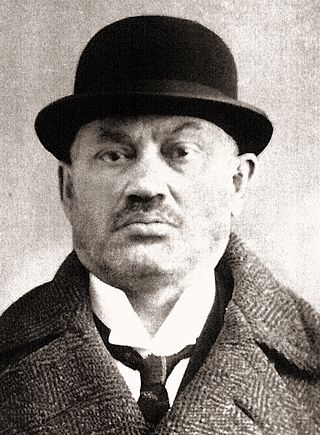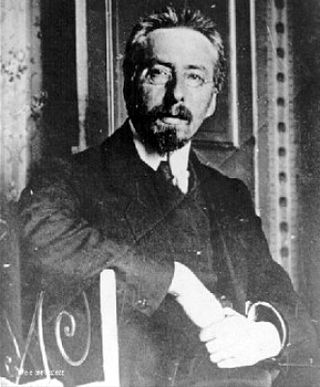
Counterintelligence (counter-intelligence) or counterespionage (counter-espionage) is any activity aimed at protecting an agency's intelligence program from an opposition's intelligence service. It includes gathering information and conducting activities to prevent espionage, sabotage, assassinations or other intelligence activities conducted by, for, or on behalf of foreign powers, organizations or persons.

The Department for the Protection of Public Safety and Order, usually called the Guard Department and commonly abbreviated in modern English sources as the Okhrana was a secret police force of the Russian Empire and part of the police department of the Ministry of Internal Affairs (MVD) in the late 19th century and early 20th century, aided by the Special Corps of Gendarmes.

Sidney George Reilly, known as the "Ace of Spies", was a Russian-born adventurer and secret agent employed by Scotland Yard's Special Branch and later by the Foreign Section of the British Secret Service Bureau, the precursor to the modern British Secret Intelligence Service (MI6/SIS). He is alleged to have spied for at least four different great powers, and documentary evidence indicates that he was involved in espionage activities in 1890s London among Russian émigré circles, in Manchuria on the eve of the Russo-Japanese War (1904–05), and in an abortive 1918 coup d'état against Vladimir Lenin's Bolshevik government in Moscow.
Narodnaya Volya was a late 19th-century revolutionary socialist political organization operating in the Russian Empire, which conducted assassinations of government officials in an attempt to overthrow the autocratic Tsarist system. The organization declared itself to be a populist movement that succeeded the Narodniks. Composed primarily of young revolutionary socialist intellectuals believing in the efficacy of direct action, Narodnaya Volya emerged in Autumn 1879 from the split of an earlier revolutionary organization called Zemlya i Volya. Similarly to predecessor groups which had already used the term "terror" positively, Narodnaya Volya proclaimed themselves as terrorists and venerated dead terrorists as "martyrs" and "heroes", justifying political violence as a legitimate tactic to provoke a necessary revolution.

Yevno Fishelevich Azef was a Russian socialist revolutionary who also operated as a double agent and agent provocateur. He worked as both an organiser of assassinations for the Socialist Revolutionary Party and a police spy for the Okhrana, the Russian Empire's secret police. He rose through the ranks to become the leader of the Socialist Revolutionary Party's terrorist branch, the SR Combat Organization, from 1904 to 1908.

Vladimir Lvovich Burtsev was a revolutionary activist, scholar, publisher and editor of several Russian language periodicals. He became famous by exposing a great number of agents provocateurs, notably Yevno Azef in 1908. Because of his own revolutionary activities and his harsh criticism of the imperial regime, including personal criticism of emperor Nicholas II, he was imprisoned several times in various European countries. In the course of his life, Burtsev fought oppressive policies from Tsarism in Imperial Russia, followed by the Bolsheviks and later Adolf Hitler's National Socialism.
Matvei Vasilyevich Golovinski was a Russian-French writer, journalist and political activist. Critics studying The Protocols of the Elders of Zion have argued that he was the author of the work. This claim is reinforced by the writings of modern Russian historian Mikhail Lepekhine, who in 1999 studied previously closed French archives stored in Moscow containing information supporting Golovinski's authorship. Back in the mid-1930s, Russian testimony in the Berne Trial had linked the head of Russian security service in Paris, Pyotr Rachkovsky, to the creation of The Protocols.
Pyotr Ivanovich Rachkovsky was chief of the Okhrana, the secret police of the Russian Empire. He was based in Paris from 1885 to 1902.
Grigory Goldenberg was a Russian revolutionary and member of Narodnaya Volya.
Casimir Pilenas, a.k.a. Casimir Palmer, and a.k.a., Casimir Palmer-Pilenas, was a private investigator, a British intelligence agent, and a "spotter" for Scotland Yard.

Roman Vatslavovich Malinovsky was a prominent Bolshevik politician before the Russian revolution, while at the same time working as the best-paid agent for the Okhrana, the Tsarist secret police. They codenamed him 'Portnoi'.

Georgy Porfiryevich Sudeykin was a Russian Gendarme colonel, the inspector of the Saint Petersburg Department for Protection of Communal Security and Order. He was killed by his own double agent, Sergey Degayev.

Sergey Petrovich Degayev was a Russian revolutionary terrorist, Okhrana agent, and the murderer of inspector of secret police Georgy Sudeykin. After emigrating to the United States, Degayev took the name Alexander Pell and became a prominent American mathematician, the founder of school of Engineering at the University of South Dakota. The Dr. Alexander Pell scholarship is named in his honor.

Andrei Aleksandrovich Argunov was a Russian revolutionary political activist and one of the leaders of the Socialist-Revolutionary Party.

The World That Never Was: A True Story of Dreamers, Schemers, Anarchists, and Secret Agents is a 2010 book by Alex Butterworth about anarchism in the late 19th and early 20th centuries in Europe and the United States.
The People's Rights Party, or Folk's Rights Party, was a radical constitutionalist political party established in Tsarist Russia in 1893. The group's political leader was the agrarian populist Mark Natanson and its ideological leading light was the literary critic and public affairs commentator N.K. Mikhailovsky.

Aizik Borisovich Aronchik was a Russian revolutionary, who took part in a failed attempt to assassinate the Tsar Alexander II.

Mikhail Yulevich Ashenbrenner was a Russian revolutionary, and one of the leaders of the Military Organisation of the Narodnaya Volya, the group that carried out the assassination of the Tsar Alexander II.

The Eremin letter was a letter allegedly written by Colonel A. M Eryomin, a high-ranking member of the Okhrana, the secret police of the Russian Empire.

Nikolai Vasilievich Kletochnikov was a Russian revolutionary who volunteered to join the police to act as a source of inside information. Already terminally ill when he volunteered to help the revolutionaries, he died in prison.














